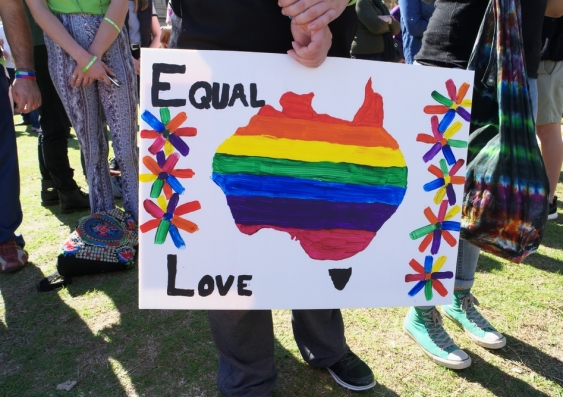Majority opposition to same-sex marriage is concentrated in rural areas, and rural Queensland in particular, according to new research mapping popular attitudes across Australia.
A study that models opposition to same-sex marriage in all 150 Australian electorates found a significant divide between rural and urban areas, with opposition peaking at about 50 per cent in parts of rural Queensland, while in inner city Sydney and Melbourne it was just 10 percent or less.
Overall, Australians were largely in favour of same-sex marriage, with a national average opposition rate of some 33 per cent. The inner city seats most supportive included Sydney’s Wentworth, held by the Prime Minister, Malcolm Turnbull, Grayndler, in the city’s inner west and the seat of Sydney, while in Melbourne it was Melbourne and Melbourne Ports.
The findings of Same-sex marriage debate in Australia: Public opinion and policy congruence, will be presented at the Australian Political Studies Association (APSA) annual conference at the University of New South Wales (Sept 26-28) on Tuesday, Sept 27.
Using information from the 2011 Census and Vote Compass data collected during this year’s federal election campaign, Dr Andrea Carson from the University of Melbourne, Shaun Ratcliff from Monash University and Dr Yannick Dufresne from Laval University in Quebec compiled a national snapshot, then scrutinised how MPs views aligned with those of their constituents.
“The take home message is there was only one state in which any seats had a bare majority opposed to same sex marriage, according to our model, and that was Queensland,” the researchers say.
The Queensland rural seats most opposed were Maranoa and Groome. Bob Katter’s northern Queensland seat of Kennedy, where the MP once famously claimed no gay men lived, were about 45 per cent opposed, as were several other Queensland rural seats, and parts of rural western NSW and South Australia.
The researchers also compared MPs’ support for same-sex marriage legislation in 2012 and in 2015 -- based on how they voted on the Marriage Amendments Bill 2012 and on their public statements since.
Compared to other parliamentarians of the same party, they found MPs representing electorates estimated to have higher levels of opposition to same-sex marriage were more likely to publicly oppose changes to the Marriage Act. However, despite a gradual shift towards support for same-sex marriage, MPs’ views were still lagging behind public opinion.
“We found evidence for the idea that they (MPs) do tend to hold a status quo bias -- it required far less than majority opposition in a given electoral division for the parliamentarian representing that area to have a 50 per cent or greater probability of opposing same-sex marriage”, the researchers say.
“Further, there is clear evidence that the Coalition has generally represented the preference of interest groups opposed to same-sex marriage, while Labor MPs are becoming increasingly supportive (of change),”
For the full conference program go to https://apsa2016.arts.unsw.edu.au
What: 2016 Australian Political Studies Association (APSA) Conference, The Politics of Justice and Rights: challenges and future directions.
When: Monday, 26 September – Wednesday, 28 September
Where: Mathews Theatres, School of Social Sciences, UNSW, Kensington


